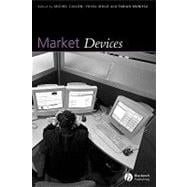
| An introduction to market devices | p. 1 |
| Calculators, lemmings or frame-makers? The intermediary role of securities analysts | p. 13 |
| Where do analysts come from? The case of financial chartism | p. 40 |
| The death of a salesman? Reconfiguring economic exchange in Swedish post-war food distribution | p. 65 |
| Struggling to be displayed at the point of purchase: the emergence of merchandising in French supermarkets | p. 92 |
| A sociology of market-things: on tending the garden of choices in mass retailing | p. 109 |
| A market of opinions: the political epistemology of focus groups | p. 130 |
| Performance testing: dissection of a consumerist experiment | p. 152 |
| Framing fish, making markets: the construction of Individual Transferable Quotas (ITQs) | p. 173 |
| Making things deliverable: the origins of index-based derivatives | p. 196 |
| The Q(u)ALYfying hand: health economics and medicine in the shaping of Swedish markets for subsidized pharmaceuticals | p. 215 |
| Price as a market device: cotton trading in Izmir Mercantile Exchange | p. 241 |
| Parasitic formulae: the case of capital guarantee products | p. 261 |
| Scorecards as devices for consumer credit: the case of Fair, Isaac & Company Incorporated | p. 284 |
| Notes on contributors | p. 307 |
| Index | p. 312 |
| Table of Contents provided by Ingram. All Rights Reserved. |
The New copy of this book will include any supplemental materials advertised. Please check the title of the book to determine if it should include any access cards, study guides, lab manuals, CDs, etc.
The Used, Rental and eBook copies of this book are not guaranteed to include any supplemental materials. Typically, only the book itself is included. This is true even if the title states it includes any access cards, study guides, lab manuals, CDs, etc.